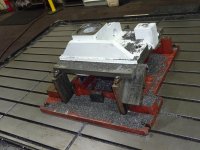DMF_TomB
Diamond
- Joined
- Dec 13, 2008
- Location
- Rochester, NY, USA
had a job yesterday and it brings out a
.
.266" dia twist drill
20.5 GL
about 15" of flute sticking out of holder (56 to 1 ratio)
75 sfpm
at F3.0
tool life set at 300 minutes and drilling mostly cast iron
.
drill start bending 3/4" and i run to control and feed hold. drill slightly dull but not too bad.
.
so i change drill, reset time for 100 minutes and change feed to F1.5 and finish drilling holes with no problems
.
now i understand short drill can take F3.0 to F6.0 feed
medium length drills (jobber) can take F3.0 often more
but how can a programmer use such a extra long skinny drill at roughly 56 to 1 length to dia ratio and not put a practical feed in program.
.
part cost over $5000 and machining time already is already over 20 hours into it so risky programming is definitely not encouraged. our scrap and rework rate for the year is lower than last year i believe mostly because i use
.
1) excel checklist to check, measure stuff and never forget things that can cause part to come back for rework. basically i add items to checklist that i have either forgotten once and caused a part to be scrap or need rework.
.
2) i have been recording feeds and speeds of all standard tools and recording any problems using tools at certain feeds and speeds and more importantly have been editing programs so tools stop breaking. always the argument slowing tool down takes too long versus not breaking the tool and faster in the long run.
.
amazing a programmer does not decide a feed rate taking into account length of drill to dia ratio. then who says it worked once before, but obviously if tool slightly dull it can push it over the edge, drill can bend and break in less than 5 seconds. for myself drilling 4 holes taking 1 minute longer versus breaking drill, possibly scrap part the extra minute drilling slower is far cheaper and faster in the long run
.
.266" dia twist drill
20.5 GL
about 15" of flute sticking out of holder (56 to 1 ratio)
75 sfpm
at F3.0
tool life set at 300 minutes and drilling mostly cast iron
.
drill start bending 3/4" and i run to control and feed hold. drill slightly dull but not too bad.
.
so i change drill, reset time for 100 minutes and change feed to F1.5 and finish drilling holes with no problems
.
now i understand short drill can take F3.0 to F6.0 feed
medium length drills (jobber) can take F3.0 often more
but how can a programmer use such a extra long skinny drill at roughly 56 to 1 length to dia ratio and not put a practical feed in program.
.
part cost over $5000 and machining time already is already over 20 hours into it so risky programming is definitely not encouraged. our scrap and rework rate for the year is lower than last year i believe mostly because i use
.
1) excel checklist to check, measure stuff and never forget things that can cause part to come back for rework. basically i add items to checklist that i have either forgotten once and caused a part to be scrap or need rework.
.
2) i have been recording feeds and speeds of all standard tools and recording any problems using tools at certain feeds and speeds and more importantly have been editing programs so tools stop breaking. always the argument slowing tool down takes too long versus not breaking the tool and faster in the long run.
.
amazing a programmer does not decide a feed rate taking into account length of drill to dia ratio. then who says it worked once before, but obviously if tool slightly dull it can push it over the edge, drill can bend and break in less than 5 seconds. for myself drilling 4 holes taking 1 minute longer versus breaking drill, possibly scrap part the extra minute drilling slower is far cheaper and faster in the long run





 Good luck with that... Why aren't you the programmer Tom???
Good luck with that... Why aren't you the programmer Tom??? 

